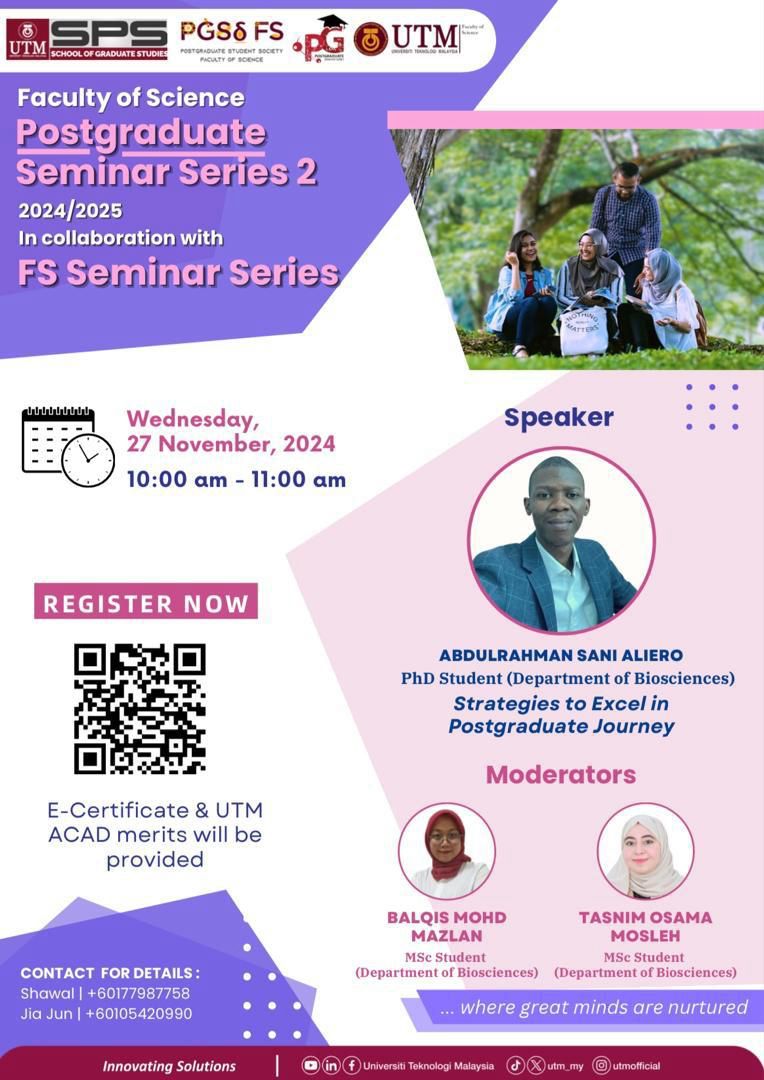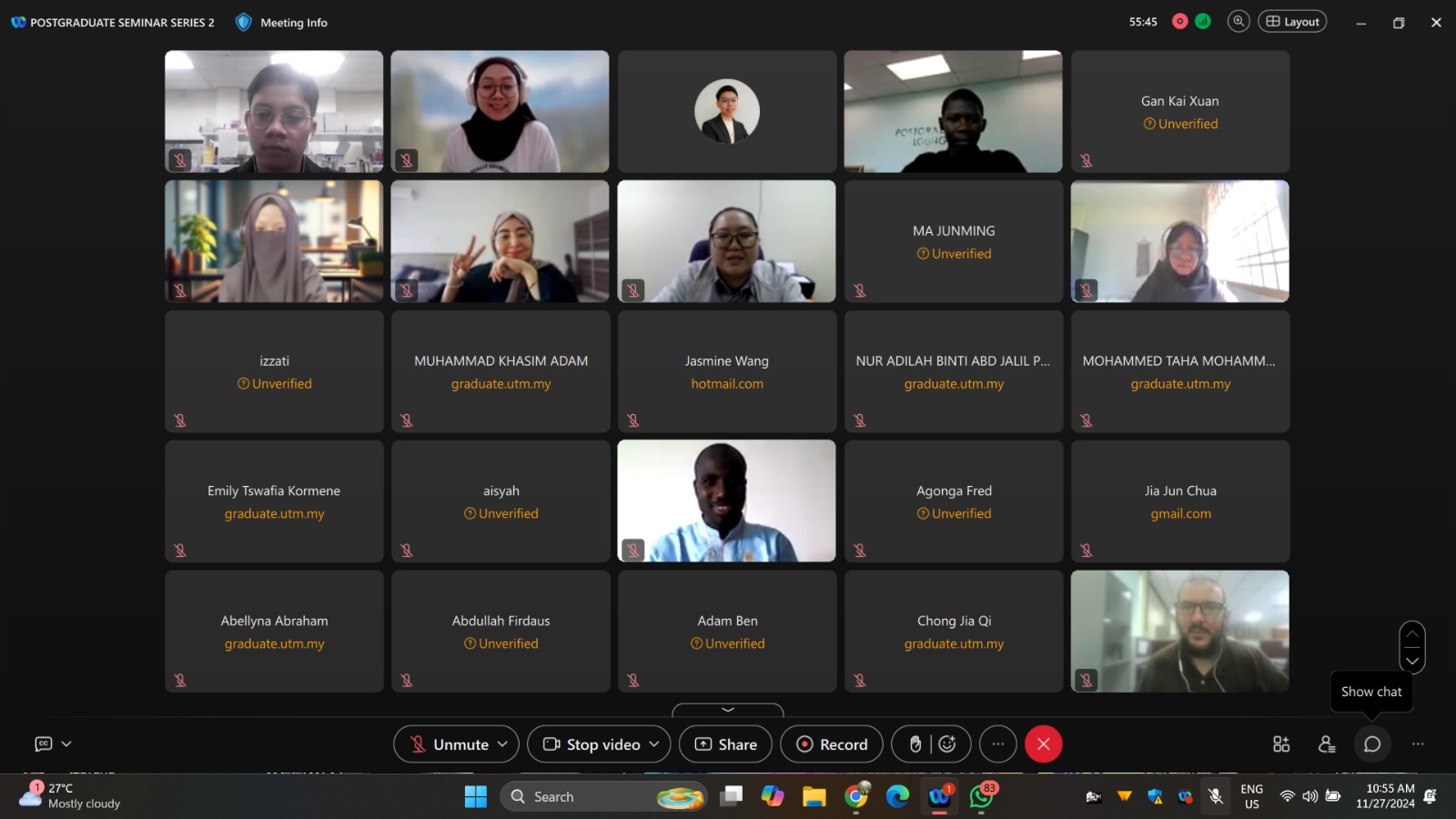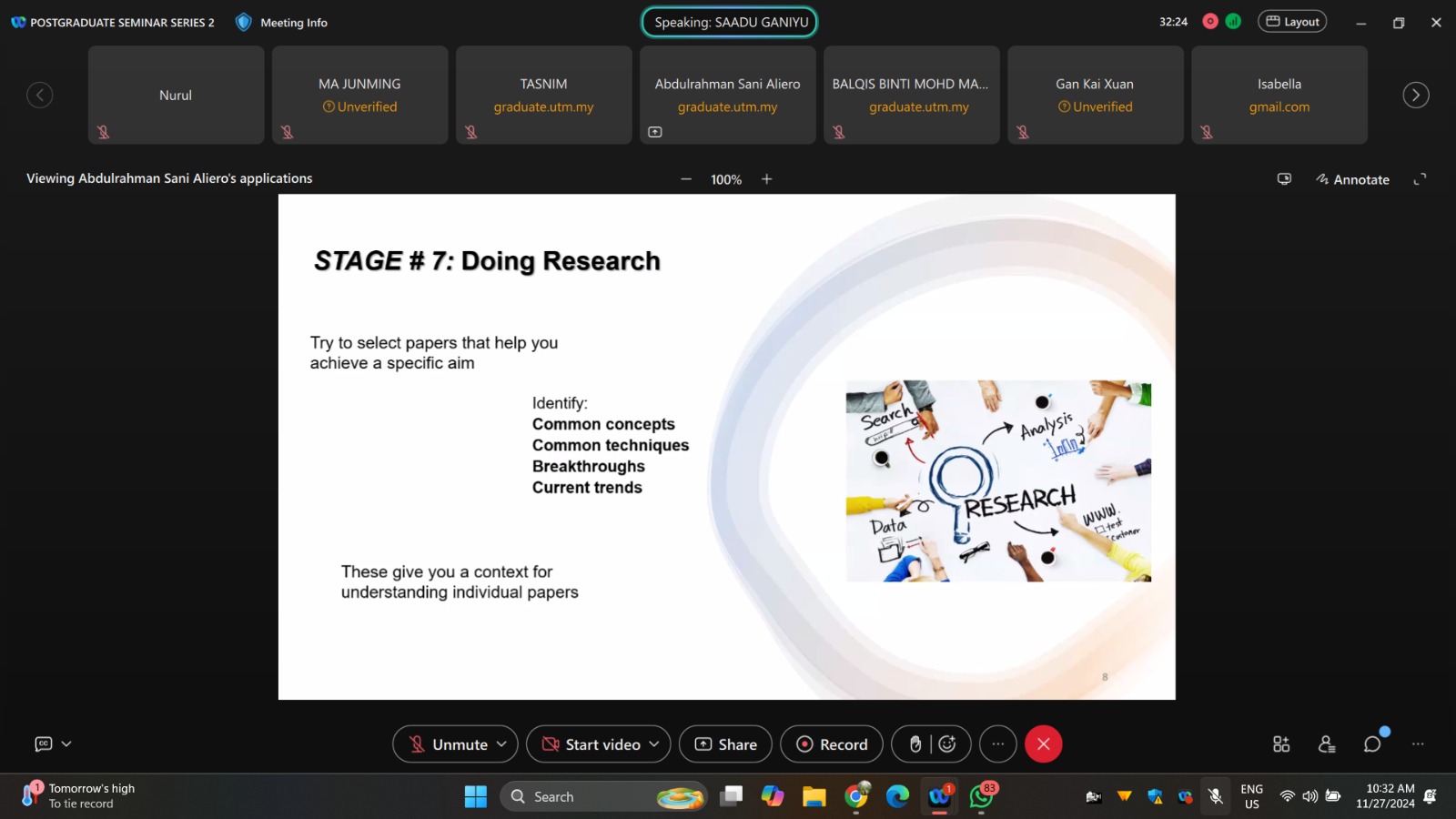Johor Bahru, 27 November 2024 – The Faculty of Science, Universiti Teknologi Malaysia (UTM), in collaboration with the Postgraduate Student Society (PGS² FS), successfully hosted the second installment of the Postgraduate Seminar Series 2024/2025. The event, held on Wednesday, 27 November 2024, from 10:00 am to 11:00 am, provided invaluable insights for postgraduate students looking to enhance their academic journey.
The featured speaker, Abdulrahman Sani Aliero, a PhD student from the Department of Biosciences, shared a comprehensive talk on “Strategies to Excel in Postgraduate Journey.” His session aimed to equip postgraduate students with effective techniques for managing their research, time, and personal development during their studies.
Moderated by Balqis Mohd Mazlan and Tasnim Osama Mosleh, both MSc students from the Department of Biosciences, the seminar facilitated engaging discussions and offered peer perspectives on navigating the postgraduate experience.
Participants received E-Certificates and UTM ACAD merits, underscoring the event’s importance in supporting academic and professional development.
The seminar series reflects the Faculty of Science’s commitment to fostering a supportive environment where postgraduate students can thrive.



Strategies to Excel in Your Postgraduate Journey
Embarking on a postgraduate journey is an ambitious decision often fueled by a desire for career advancement, personal growth, or a passion for a particular subject. However, as Abdulrahman Sani Aliero, a PhD student from the Department of Biosciences at Universiti Teknologi Malaysia (UTM), highlights in his talk, beginning a postgraduate program is far easier than completing one. To thrive in this academic endeavor, students must adopt specific strategies that encompass understanding requirements, developing independence, effective communication with supervisors, time management and personal well-being.
The first step in this journey is to clearly understand why you are pursuing postgraduate studies. Whether it’s to develop an existing career, acquire new skills, or indulge a deep-seated passion for research, having a clear motivation will provide the necessary drive when challenges arise. However, it is also important to recognize the complexity of postgraduate work, particularly in PhD programs, which demand persistence and dedication.
One of the key elements to ensuring success is being aware of the graduation requirements. Postgraduate students should regularly refer to the Graduate Student Handbook to understand core courses, research credits, publication expectations, and graduation requirements. This knowledge helps in planning and avoiding unnecessary surprises during the academic journey.
A critical strategy highlighted by Abdulrahman is the need to be independent. Unlike undergraduate programs, postgraduate studies do not cater to spoon-feeding. Students must take ownership of their learning and research. This independence involves developing essential skills such as experimental techniques, software proficiency, data analysis, effective writing and presentation skills. Being prepared and proactive can significantly enhance the postgraduate experience, as “luck favors only prepared minds.”
Another crucial aspect of succeeding in postgraduate studies is understanding and building a productive relationship with your supervisor. Supervisors play a pivotal role in guiding research, but each has different expectations and communication styles. It is vital to learn these preferences and establish a clear meeting structure that includes setting agendas and discussing outcomes from previous meetings. Effective communication and respect are the cornerstones of a successful supervisor-student relationship.
Furthermore, working with your supervisor requires a proactive mindset. Abdulrahman emphasizes the importance of working hard, following plans, and being transparent about progress. In contrast, behaviors such as laziness, misinformation, or skipping planned tasks can derail progress. Mutual respect and consistent effort are key to maintaining a productive relationship with your supervisor.
An organized PhD journey is one that is carefully planned. Structuring your research, setting realistic goals, and adhering to timelines help in maintaining focus and reducing stress. Equally important is the process of conducting research itself. Identifying common concepts, techniques, and current trends can streamline the research process. Selecting papers that contribute directly to your research goals provides context and aids in understanding individual studies better. Avoiding multitasking and focusing on priorities using tools like the Importance-Urgent Matrix can improve productivity.
Effective time management is an indispensable skill for postgraduate students. Allocating time wisely, setting priorities, and maintaining a balance between research and personal life are essential for long-term success. Alongside managing time, students must also focus on self-management. This involves recognizing strengths, adapting to challenges, and understanding that excellence takes time. Comparing oneself to others can lead to unnecessary stress; therefore, it is crucial to prioritize well-being, manage energy levels, and practice patience.
Lastly, continuous learning and self-improvement are vital components of postgraduate success. Exploring online courses and academic resources can offer new skills and insights. Platforms such as Nature’s Career Development Resources and Elsevier’s Researcher Academy provide valuable learning materials that can complement formal academic training.
In conclusion, the postgraduate journey is a challenging yet rewarding experience. By understanding the requirements, taking ownership of the process, building strong relationships with supervisors, and managing both time and self effectively, students can excel in their academic pursuits. Abdulrahman Sani Aliero’s strategies provide a comprehensive roadmap to help postgraduate students navigate their journey with confidence and success.
Abdulrahman Sani Aliero
PhD students (Biosciences)

